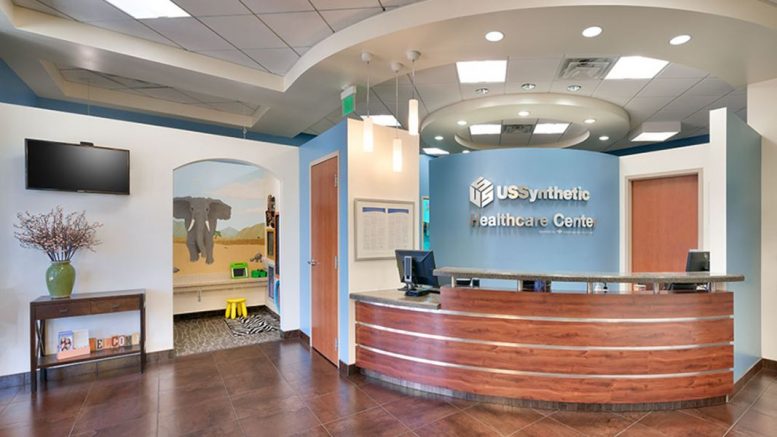The new model has increased patient satisfaction scores and reduced the employer’s costs by $19.79 per member per month.
Intermountain Healthcare is helping to slow the rise in healthcare costs and improve the health of employees at US Synthetic, by operating and managing an on-site, prevention-oriented primary care clinic at the Orem, UT, company, which produces diamond cutting and drilling components for the gas and oil industry and employs about 500 people.
Since November 2020, the Intermountain clinic has used a “reimagined primary care” model of value-based care, which focuses on prevention and keeping people well. Intermountain manages and staffs the clinic in partnership with Castell, its population health entity.
“We’re not looking at who’s on the schedule, but who should be on the schedule,” explained Michelle James, Castell’s executive director of commercial products. “We’ll look at who’s due for preventive care, who’s been sick recently, who’s been to the emergency room recently, who had a recent injury, and proactively reach out to them to see how they’re doing.”
The clinic is staffed by an Intermountain physician, practice director, care coordinator and medical assistants. The clinic also provides access to mental health providers through digital Connect Care visits.
The new model includes a robust data platform where key metrics are reviewed regularly to ensure caregivers follow up with patients consistently and regularly.
In just five short months, the reimagined primary care providers at the clinic have an average of 15 percent higher patient satisfaction scores than under the old model. And various quality measures for patients’ health are averaging 5 to 15 percent higher.
Initial outcomes also show patients who see these providers are slightly less likely to utilize emergency room visits, be admitted to the hospital or need outpatient imaging. Average cost savings in the first five months for US Synthetic is $19.79 less per member per month.
Company leaders are happy their employees are healthier so they can do their best work, avoid injuries on the job, have fewer sick days, and can better enjoy their life away from work. The Intermountain providers who work in the clinic have great job satisfaction as well.
“Instead of focusing on filling the schedule, we can focus on providing the best possible care for our patients,” says Spencer Scoville, DO, a provider at the clinic. “Our focus is on anticipating patient’s needs so they can get the care they need immediately. We’re actively looking for gaps in between care or needed follow up.”
Patients have been pleased with the changes as the clinic transitioned from a more traditional primary care model, which the clinic has used since opening in 2012.
“The new model means patients can get in quickly for a visit, and spend less time in the waiting room and have more access and quality time with their provider,” says Ryan LeCheminant, clinic practice director.
The model has been piloted and proven successful at other Intermountain primary care clinics not associated with an employer. The partnership between Intermountain and US Synthetic works because both organizations have similar values and missions.
“Without people, we can’t accomplish our vision. I would say this last year showed us how critical the health of our people is, and when they are not able to be at work to do their best, we don’t achieve our purpose fully,” said David Brady, vice president of employee care at US Synthetic.
Onsite clinics typically make sense for employers who are self-funded and are looking for opportunities to control their health insurance plan cost, focus on wellness and provide convenience for their employees.
The US Synthetic clinic has a shared-risk payment model. It pays a capitated amount for the clinic, and then there are performance guarantees in place, based on quality, outcomes, patient experience and managing total cost of care that Intermountain must meet to receive full payment.
Payment is based on both clinic utilization and metrics such as reduced emergency department visits and improved patient outcomes. If Intermountain improves patient outcomes, the employer promises to pay a certain amount for those outcomes.

